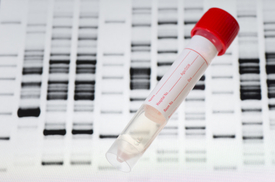Forensic Genetics: DNA and Biologic Evidence
Forensic Science continues to reap tremendous benefits from the introduction of Forensic DNA methods and technologies. Known as the blueprint of life, DNA is found in almost every living cell. What makes DNA so useful as a forensic target? There are subtle differences in the DNA sequence between any two individuals (one exception might apply to monozygotic twins during their early development stage). In ascertaining this uniqueness of a DNA profile, a link between a crime scene and a perpetrator can be made. Using only a few cells from a crime scene, whether deposited by touch, by shedding, or carried by a bodily fluid, a forensic scientist can now generate a DNA profile that can be matched to potential suspects. DNA evidence has led to convictions as well as exonerations in numerous crime investigations all over the world, and will continue to have this impact for the foreseeable future.
The utility of DNA in forensics comes with a significant responsibility that cannot be delegated to one group or another. Scientists, law professionals, and ordinary citizens who find themselves serving as jurors must shoulder this responsibility to make sure this type of evidence is used effectively in preserving civil liberties and justice under the law. We must recognize the power as well as the limitations of forensic DNA science. More importantly, we must preserve the integrity of forensic science itself as an objective "science". ForensiGen was founded specifically to help the law community achieve that goal: through education, validation, and appropriate scrutiny.
The utility of DNA in forensics comes with a significant responsibility that cannot be delegated to one group or another. Scientists, law professionals, and ordinary citizens who find themselves serving as jurors must shoulder this responsibility to make sure this type of evidence is used effectively in preserving civil liberties and justice under the law. We must recognize the power as well as the limitations of forensic DNA science. More importantly, we must preserve the integrity of forensic science itself as an objective "science". ForensiGen was founded specifically to help the law community achieve that goal: through education, validation, and appropriate scrutiny.
ForensiGen Specializes in Criminal and Civil Cases:- Evaluation of Forensic DNA and Biologic Evidence - DNA Evidence (STR, Y-STR, RFLP, Mitochondria) - Biologic Evidence (Semen, Saliva, Blood) - Evaluation of Case Discovery Material - Evidence Testing/Re-testing - Court Services, Expert Testimony, Reports and Affidavits |
Our Experience:
ForensiGen has been providing forensic genetics counsel and testing services at the national level. Our experience includes cold-hit cases, RFLP evidence from the early 90's, STR analysis, mitochondrial analysis from hair samples, DNA sequencing, "touch DNA" from weapons and drug packages, DNA mixture samples from multiple contributors, and much more. We carefully review State and Private forensic laboratory data, results, and interpretations. We analyze all available discovery material for relevant information and provide our clients with the big picture as well as the details of our findings. Our reports and affidavits are thorough, scientifically based, clearly written, and summarized for a non-scientist (redacted samples are available for your evaluation). ForensiGen works closely with clients inside and outside the courtroom. Contact us if you would like to receive a list of nationally recognized law professionals who have worked with us already. For fee schedule information or to request a quote for service, contact us at: [email protected] or fill out the contact sheet on this website.

